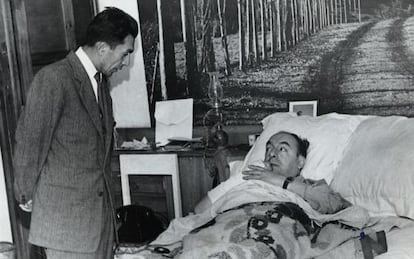Autopsy results confirm Chilean poet Neruda died of cancer
The Communist Party and family members of the writer remain convinced that he did not die of natural causes


A group of international specialists gathered in Santiago de Chile on Tuesday determined that the poet Pablo Neruda suffered from prostate cancer when he died in 1973. There were no traces of chemical agents in his body to suggest that he had been poisoned.
The official story said that Neruda died of prostate cancer on September 23, 1973, 12 days after the military coup that toppled Salvador Allende. In 2011, his chauffeur, Manuel Araya, said that he had been assassinated by members of Augusto Pinochet 's administration while he was hospitalized at the Clínica Santa María in Santiago. The Communist Party filed a formal request for an inquiry that would clear up the causes of his death.
A judge opened the investigation. The body was disinterred on April 8 from its grave in Isla Negra, a costal community about 100 kilometers from the capital.
Patricio Bustos, director of Chile's Legal Medical Services, was in charge of coordinating the team of doctors. Bustos said that the tests proved that Neruda was taking medicine for prostate cancer and that there was no evidence to suggest that he did not die of natural causes. The specialists noted that all the best and latest technologies had been used.
Neruda's chauffeur said he was killed by injection
"We have arrived at a technical and scientific conclusion that will complement the judicial investigation," said Francisco Etxeberria, a Spanish forensic expert on the team. "Judge Mario Carroza will determine the final truth." Etxeberria, a professor at the medical school of the Universidad del País Vasco stressed that the conclusion was unanimous.
Judge Carroza has been waiting for the report from this multidisciplinary team of experts from the United States, Spain and Chile for six months. Still, he intends to proceed with the judicial investigation. "The Neruda case will not be closed as long as there are doubts and if necessary, other experts will be called in."
Carroza was referring to the suspicions that the Communist Party and Neruda's nephew, Rodolfo Reyes, harbor. Reyes maintains that his uncle was killed by Pinochet's regime. "It could be that there are no traces of certain substances injected into the body because of the time that has passed," said Eduardo Contreras, the attorney for the Communist Party. "There are agents like the gas, sarin, that disappear over time. The investigation has us still convinced that the writer was assassinated and this medical report will not close the case."
Per plaintiffs' request, the judge has also ordered DNA tests to make sure that the remains the autopsy team analyzed were in fact Neruda's. The results will come in a few days.
Manuel Araya worked with Neruda during the last few months of his life. In 2011 he said the Nobel Prize winner was killed because he was a well-known international figure who was going organize the opposition to Pinochet from abroad. "Sometime after September 11, the poet was going to move to Mexico with his wife Matilde," Araya recounted. "The plan was to topple the tyrant from abroad in less than three months. He was going to call on the world to help oust Pinochet. But before he took the plane, they took advantage of his being in the hospital and gave him a lethal injection in the stomach."
Translation: Dyane Jean François
Tu suscripción se está usando en otro dispositivo
¿Quieres añadir otro usuario a tu suscripción?
Si continúas leyendo en este dispositivo, no se podrá leer en el otro.
FlechaTu suscripción se está usando en otro dispositivo y solo puedes acceder a EL PAÍS desde un dispositivo a la vez.
Si quieres compartir tu cuenta, cambia tu suscripción a la modalidad Premium, así podrás añadir otro usuario. Cada uno accederá con su propia cuenta de email, lo que os permitirá personalizar vuestra experiencia en EL PAÍS.
¿Tienes una suscripción de empresa? Accede aquí para contratar más cuentas.
En el caso de no saber quién está usando tu cuenta, te recomendamos cambiar tu contraseña aquí.
Si decides continuar compartiendo tu cuenta, este mensaje se mostrará en tu dispositivo y en el de la otra persona que está usando tu cuenta de forma indefinida, afectando a tu experiencia de lectura. Puedes consultar aquí los términos y condiciones de la suscripción digital.








































